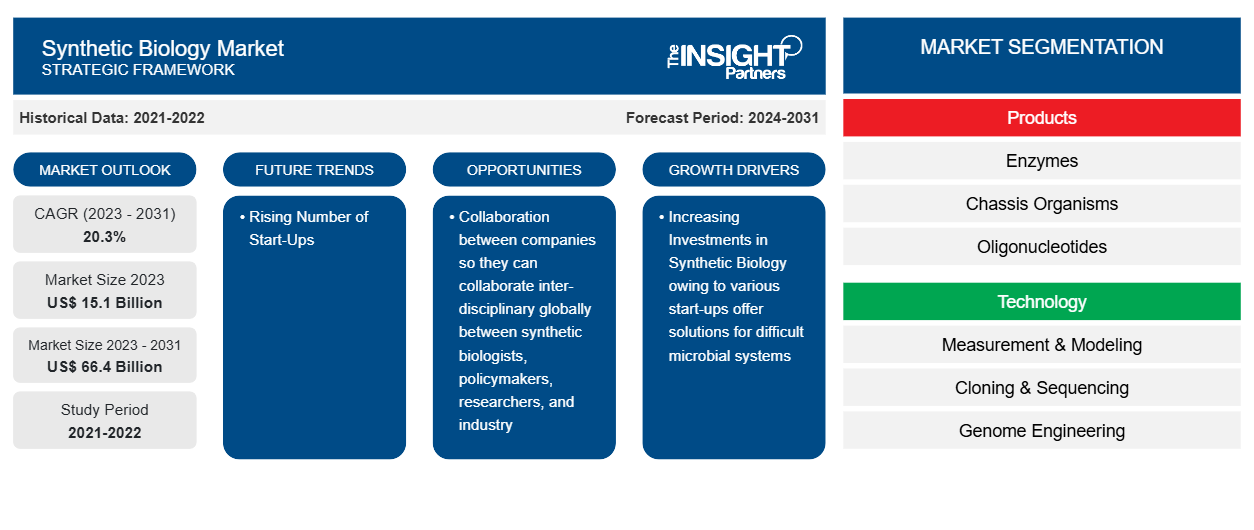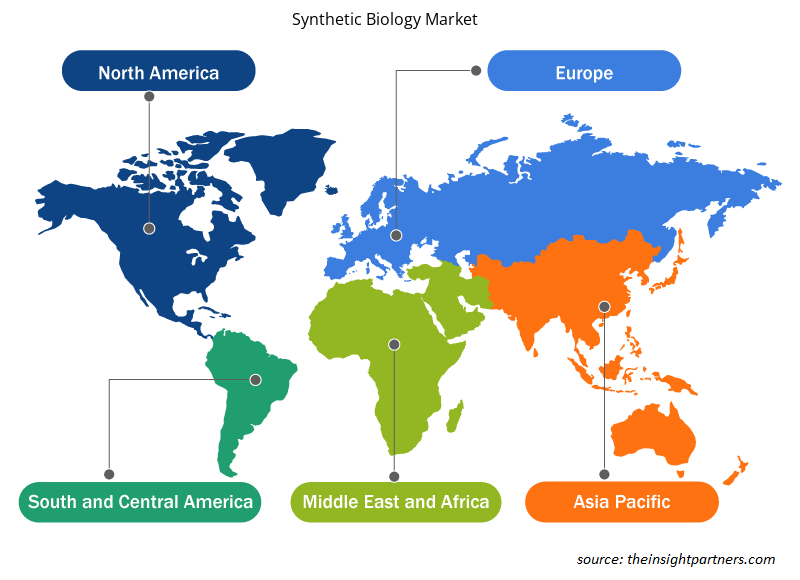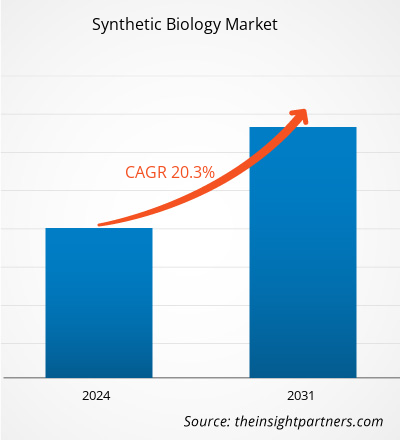The synthetic biology market size is projected to reach US$ 66.4 billion by 2031 from US$ 15.1 billion in 2023. The market is expected to register a CAGR of 20.3% during 2023–2031. Advanced synthetic biology is likely to remain a key trend in the market.
Synthetic Biology Market Analysis
Key factors driving market growth are increasing investments in synthetic biology and the rising number of start-ups. Synthetic biology offers companies a broad scope of opportunities to collaborate inter-disciplinary globally between synthetic biologists, policymakers, researchers, and industry. For instance, in August 2021, Codex DNA announced a Synthetic Biology Collaboration with the U.S. Department of Agriculture to identify scalable therapeutic measures against citrus greening disease.
Synthetic Biology Market Overview
Synthetic biology is an emerging concept with numerous applications in the chemicals, agriculture, pharmaceuticals, and energy industries. Various start-ups offer solutions for complex microbial systems. For example, US-based startup Asimov offers a genetic design platform for mammalian synthetic biology. They integrate synthetic biology, multi-omics measurement, computational modeling, and machine learning in a single platform to advance therapeutic applications. Additionally, Benchling provides CAD tools, GenScript offers gene synthesis, Ginkgo Bioworks assists in organism engineering, Transcriptis (a bioinformatics company) offers solutions facilitating cloud labs/automation, and Glowee offers consumer products.
Customize This Report To Suit Your Requirement
You will get customization on any report - free of charge - including parts of this report, or country-level analysis, Excel Data pack, as well as avail great offers and discounts for start-ups & universities
Synthetic Biology Market: Strategic Insights

- Get Top Key Market Trends of this report.This FREE sample will include data analysis, ranging from market trends to estimates and forecasts.
Customize This Report To Suit Your Requirement
You will get customization on any report - free of charge - including parts of this report, or country-level analysis, Excel Data pack, as well as avail great offers and discounts for start-ups & universities
Synthetic Biology Market: Strategic Insights

- Get Top Key Market Trends of this report.This FREE sample will include data analysis, ranging from market trends to estimates and forecasts.
Synthetic Biology Market Drivers and Opportunities
Rising Number of Start-Ups
Biotechnology entrepreneurs can quickly raise funds and procure equipment and space from governments in their countries. For instance, For instance, the Indian government financed IITM Bioincubator, a division of the Indian Institute of Technology Madras, to establish a bioinformatics infrastructure facility and a cutting-edge cancer biology research center. Organizations include the Department of Science and Technology (DST), the Department of Biotechnology (DBT), and the Council of Scientific and Industrial Research (CSIR) contributed the funding. In China, Chinaccelerator is a financer that provides mentorship programs to help start-ups. It is also associated with SOSV Investments LLC, which helps in the establishment of start-ups by providing funds through programs such as RebelBio and Indie Bio. The easy availability of funds for ideas motivates entrepreneurs worldwide to establish synthetic biology businesses.
Collaboration Between Companies
Synthetic biology is the branch of biotechnology that would provide opportunities for nearly every aspect of the healthcare sector, including drug delivery, protein therapeutics, biofuels, and food and agricultural product development. It provides opportunities for biotechnology entrepreneurs to accelerate discovery, reduce clinical failures, and be more cost-efficient. Synthetic biology offers companies a broad scope of opportunities to collaborate inter-disciplinary globally between synthetic biologists, policymakers, researchers, and industry. For instance, in August 2021, Riffyn Inc. and Imperial College’s Centre collaborated for Synthetic Biology (IC-CSynB), and SynbiCITE’s London Biofoundry sets for synthetic biology research and education in scientific reproducibility. These are the primary factors that make companies grow in the synthetic biology market and are likely to impact market growth in the forecast period.
Synthetic Biology Market Report Segmentation Analysis
Key segments that contributed to the derivation of the synthetic biology market analysis are product, technology, and application.
- Based on product, the synthetic biology market is segmented into enzymes, chassis organisms, oligonucleotides, and xeno-nucleic acids. The oligonucleotides segment held a larger market share in 2023.
- By technology, the market is segmented into measurement & modeling, cloning & sequencing, genome engineering, gene synthesis, nanotechnology, and others. The gene synthesis segment held the largest share of the market in 2023.
- By application, the market is segmented into medical applications, industrial applications, food and agriculture, environmental applications, and others. The medical applications segment held the largest share of the market in 2023.
Synthetic Biology Market Share Analysis by Geography
The geographic scope of the synthetic biology market report is mainly divided into five regions: North America, Asia Pacific, Europe, Middle East & Africa, and South & Central America.
Synthetic biology is a significant tool for biological advances, which provides potential for developing biological weapons, possible unforeseen negative impacts on human health, and any potential environmental impact. Security issues can be avoided by regulating industry biotechnology use through policy legislation.
The various government initiatives and funding offered are excellent support for the synthetic biology market's growth in the US. For instance, according to a National Center for Biotechnology Information (NCBI) report, the US government offers approximately US$220 million yearly for synthetic biology research and development. This fund includes investments from the Department of Energy, the National Science Foundation (NSF), the Department of Defense (DoD) (including DARPA), the National Institutes of Health (NIH), and the US Department of Agriculture (USDA).
Synthetic Biology Market Regional Insights
The regional trends and factors influencing the Synthetic Biology Market throughout the forecast period have been thoroughly explained by the analysts at Insight Partners. This section also discusses Synthetic Biology Market segments and geography across North America, Europe, Asia Pacific, Middle East and Africa, and South and Central America.

- Get the Regional Specific Data for Synthetic Biology Market
Synthetic Biology Market Report Scope
| Report Attribute | Details |
|---|---|
| Market size in 2023 | US$ 15.1 Billion |
| Market Size by 2031 | US$ 66.4 Billion |
| Global CAGR (2023 - 2031) | 20.3% |
| Historical Data | 2021-2022 |
| Forecast period | 2024-2031 |
| Segments Covered |
By Products
|
| Regions and Countries Covered | North America
|
| Market leaders and key company profiles |
Synthetic Biology Market Players Density: Understanding Its Impact on Business Dynamics
The Synthetic Biology Market market is growing rapidly, driven by increasing end-user demand due to factors such as evolving consumer preferences, technological advancements, and greater awareness of the product's benefits. As demand rises, businesses are expanding their offerings, innovating to meet consumer needs, and capitalizing on emerging trends, which further fuels market growth.
Market players density refers to the distribution of firms or companies operating within a particular market or industry. It indicates how many competitors (market players) are present in a given market space relative to its size or total market value.
Major Companies operating in the Synthetic Biology Market are:
- THERMO FISHER SCIENTIFIC INC
- Agilent Technologies, Inc.
- MERCK KGaA
- New England Biolabs
- Integrated DNA Technologies
- Twist Bioscience
Disclaimer: The companies listed above are not ranked in any particular order.

- Get the Synthetic Biology Market top key players overview
Synthetic Biology Market News and Recent Developments
The Synthetic Biology Market is evaluated by gathering qualitative and quantitative data post primary and secondary research, which includes important corporate publications, association data, and databases. A few of the developments in the synthetic biology market are listed below:
- bit.bio and Ginkgo Bioworks announced bit.bio as an inaugural partner of the Ginkgo Technology Network. The Network, launched, is a groundbreaking ecosystem of cutting-edge technology partners committed to collaborating with Ginkgo to provide new, integrated capabilities to drive success in customer R&D programs. (Source: bit.bio, Company Website, February 2024)
- Sumitomo Chemical Co., Ltd and Ginkgo Bioworks announced a new program to develop functional chemicals with synthetic biology and expand upon the companies’ existing biomanufacturing partnership. (Source: Sumitomo Chemical Co., Ltd, Company Website, July 2023)
Synthetic Biology Market Report Coverage and Deliverables
The “Synthetic Biology Market Size and Forecast (2021–2031)” report provides a detailed analysis of the market covering below areas:
- Synthetic biology market size and forecast at global, regional, and country levels for all the key market segments covered under the scope
- Synthetic biology market trends as well as market dynamics such as drivers, restraints, and key opportunities
- Detailed PEST/Porter’s Five Forces and SWOT analysis
- Synthetic biology market analysis covering key market trends, global and regional framework, major players, regulations, and recent market developments.
- Industry landscape and competition analysis covering market concentration, heat map analysis, prominent players, and recent developments for the synthetic biology market
- Detailed company profiles
Frequently Asked Questions
Which region dominated the synthetic biology market in 2023?
North America dominated the synthetic biology market in 2023.
What are the driving factors impacting the synthetic biology market?
Key factors that are driving growth of the market are increasing investments in synthetic biology and rising number of start-ups in the market. However, the biosafety and biosecurity concerns in synthetic biology hamper the market growth.
What are the future trends of the synthetic biology market?
Advanced synthetic biology is likely to remain a key trend in the market.
Which are the leading players operating in the synthetic biology market?
THERMO FISHER SCIENTIFIC INC, Agilent Technologies, Inc., MERCK KGaA, New England Biolabs, Integrated DNA Technologies, Twist Bioscience, GenScript Biotech Corporation, Novozymes A/S, Codexis.
What is the expected CAGR of the synthetic biology market?
The market is expected to register a CAGR of 20.3% during 2023–2031.
- Historical Analysis (2 Years), Base Year, Forecast (7 Years) with CAGR
- PEST and SWOT Analysis
- Market Size Value / Volume - Global, Regional, Country
- Industry and Competitive Landscape
- Excel Dataset
Testimonials
Reason to Buy
- Informed Decision-Making
- Understanding Market Dynamics
- Competitive Analysis
- Identifying Emerging Markets
- Customer Insights
- Market Forecasts
- Risk Mitigation
- Boosting Operational Efficiency
- Strategic Planning
- Investment Justification
- Tracking Industry Innovations
- Aligning with Regulatory Trends
Yes! We provide a free sample of the report, which includes Report Scope (Table of Contents), report structure, and selected insights to help you assess the value of the full report. Please click on the "Download Sample" button or contact us to receive your copy.
Absolutely — analyst assistance is part of the package. You can connect with our analyst post-purchase to clarify report insights, methodology or discuss how the findings apply to your business needs.
Once your order is successfully placed, you will receive a confirmation email along with your invoice.
• For published reports: You’ll receive access to the report within 4–6 working hours via a secured email sent to your email.
• For upcoming reports: Your order will be recorded as a pre-booking. Our team will share the estimated release date and keep you informed of any updates. As soon as the report is published, it will be delivered to your registered email.
We offer customization options to align the report with your specific objectives. Whether you need deeper insights into a particular region, industry segment, competitor analysis, or data cut, our research team can tailor the report accordingly. Please share your requirements with us, and we’ll be happy to provide a customized proposal or scope.
The report is available in either PDF format or as an Excel dataset, depending on the license you choose.
The PDF version provides the full analysis and visuals in a ready-to-read format. The Excel dataset includes all underlying data tables for easy manipulation and further analysis.
Please review the license options at checkout or contact us to confirm which formats are included with your purchase.
Our payment process is fully secure and PCI-DSS compliant.
We use trusted and encrypted payment gateways to ensure that all transactions are protected with industry-standard SSL encryption. Your payment details are never stored on our servers and are handled securely by certified third-party processors.
You can make your purchase with confidence, knowing your personal and financial information is safe with us.
Yes, we do offer special pricing for bulk purchases.
If you're interested in purchasing multiple reports, we’re happy to provide a customized bundle offer or volume-based discount tailored to your needs. Please contact our sales team with the list of reports you’re considering, and we’ll share a personalized quote.
Yes, absolutely.
Our team is available to help you make an informed decision. Whether you have questions about the report’s scope, methodology, customization options, or which license suits you best, we’re here to assist. Please reach out to us at sales@theinsightpartners.com, and one of our representatives will get in touch promptly.
Yes, a billing invoice will be automatically generated and sent to your registered email upon successful completion of your purchase.
If you need the invoice in a specific format or require additional details (such as company name, GST, or VAT information), feel free to contact us, and we’ll be happy to assist.
Yes, certainly.
If you encounter any difficulties accessing or receiving your report, our support team is ready to assist you. Simply reach out to us via email or live chat with your order information, and we’ll ensure the issue is resolved quickly so you can access your report without interruption.





















 Get Free Sample For
Get Free Sample For